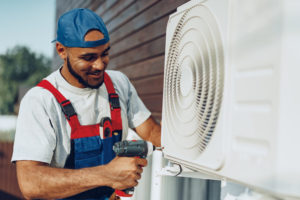 Thinking about taking on a DIY HVAC project? Please take a moment to think again. Today’s heating and cooling units incorporate advanced technology. Beyond the simple task of regular filter changes, most work on furnaces and air conditioners is beyond the scope of the average do-it-yourselfer. Professional HVAC technicians are extensively trained and receive industry certification. The typical homeowner is not. Here are just a few examples of why not to attempt DIY HVAC work.
Thinking about taking on a DIY HVAC project? Please take a moment to think again. Today’s heating and cooling units incorporate advanced technology. Beyond the simple task of regular filter changes, most work on furnaces and air conditioners is beyond the scope of the average do-it-yourselfer. Professional HVAC technicians are extensively trained and receive industry certification. The typical homeowner is not. Here are just a few examples of why not to attempt DIY HVAC work.
- It can be dangerous. Gas-fired furnaces utilize flammable, toxic natural gas, and the burner flame produces temperatures north of 3,000 degrees. A gas furnace also generates toxic fumes that can be fatal. Improper combustion and/or venting can spread deadly carbon monoxide gas throughout the house, endangering all occupants. Components in a central air conditioner, such as the compressor, utilize 220-volt electricity, which presents an electrocution danger as well as fire hazards if serviced by the untrained and inexperienced.
- You’re not equipped for DIY HVAC. A hammer, screwdriver, and pliers aren’t enough. The array of technology utilized to install, adjust, and service today’s HVAC units is generally not included in the toolbox of a typical do-it-yourselfer. Attempting this work without proper equipment is likely to produce adverse consequences, including but not limited to poor heating and cooling performance, high operating costs, and a shortened expected service life for the unit.
- It won’t save money. In fact, the DIY approach may well cost you far more than professional service over the long run. Today’s HVAC units deliver higher efficiency and lower operating costs. However, this depends heavily on proper installation and professional service. When performed by untrained and poorly equipped individuals, greater energy consumption and higher monthly operating costs may be the permanent result as long as the unit is installed.
- It may void your warranty. Most manufacturers’ warranty terms clearly stipulate that all service and repairs must be performed by a licensed HVAC contractor. Otherwise, the warranty is void and the do-it-yourselfer is responsible for all costs of repair and/or replacement.
Avoid DIY HVAC attempts and choose trained, certified HVAC technicians instead. Contact the professionals at Hansberger Refrigeration and Electric Company.

